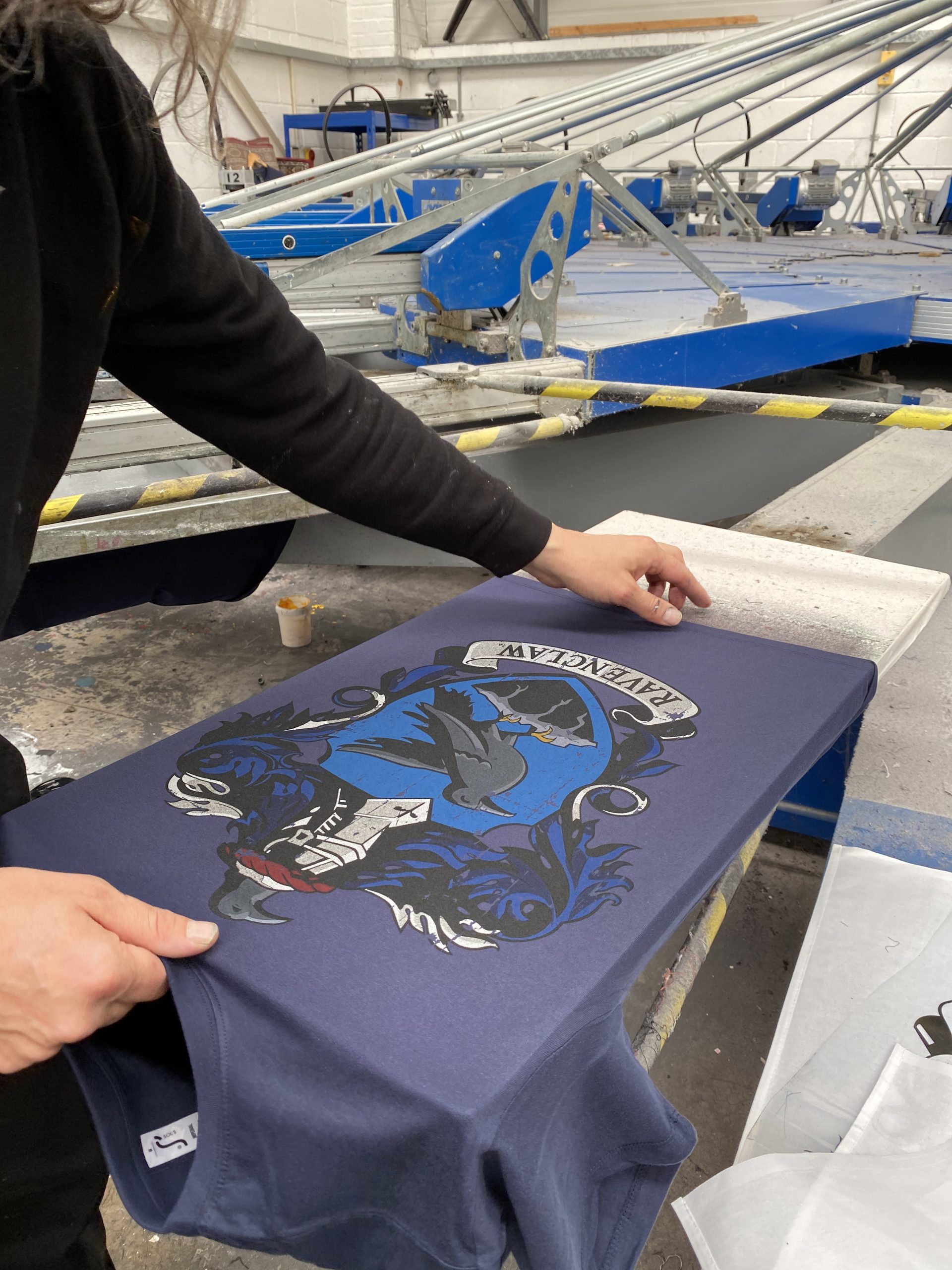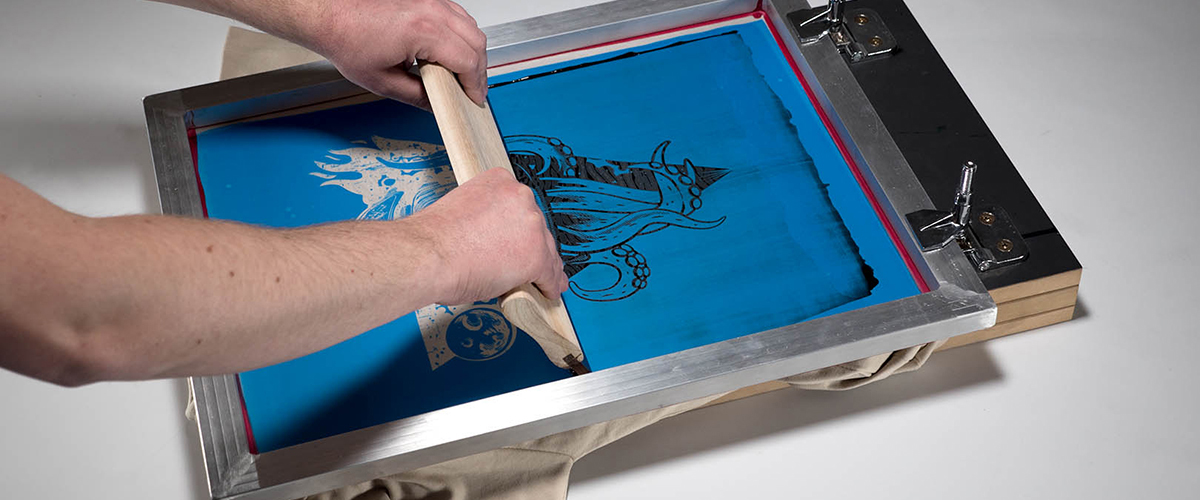The Necessary Overview to Understanding Screen Printing and Its Versatile Utilizes
Screen printing has a rich history that dates back to ancient times, advancing into an advanced technique utilized across different markets today. This overview checks out the details of the screen printing procedure, describing its applications in fashion, home, and marketing style - 10:9 Design near me. Recognizing these principles can open up innovative possibility for both artistic and business jobs. The complying with areas will reveal essential ideas and strategies to boost one's screen printing endeavors
The History of Screen Printing
Screen printing has origins that trace back centuries, its evolution reflects the creative and technical innovations of numerous cultures. Coming from ancient China, the technique was originally utilized for embellishing fabrics and later infect Japan, where it became essential to Ukiyo-e woodblock printing. The technique changed to Europe in the 18th century, where it got appeal amongst craftsmens and business printers. The invention of photo solution in the 20th century revolutionized screen printing, enabling for more complex designs and better efficiency. Musicians like Andy Warhol additionally pushed its popularity, using the medium to develop legendary works that mixed commercialism and fine art. By the late 20th century, screen printing had actually established itself as a flexible strategy, utilized in vogue, advertising, and great art. Today, it remains to advance, incorporating electronic innovation and increasing its applications throughout different sectors.
The Screen Printing Refine Explained
Screen printing transforms artistic visions into concrete layouts through a collection of exact steps. Initially, an image is produced and then moved onto a screen, typically made from great mesh fabric extended over a frame. A light-sensitive solution is used to the screen, which is subjected to light, setting in locations not covered by the photo. After rinsing the unhardened solution, a stencil is formed.
Next, the screen is put over the substratum, whether it be textile, paper, or one more product. Ink is then pressed through the open areas of the pattern using a squeegee, transferring the style onto the substratum listed below. This procedure can be repeated for several shades, requiring separate screens for each tone. Lastly, the printed item is healed utilizing warm to assure the ink sticks correctly, causing a sturdy, lively style on-line.
Sorts Of Screen Printing Techniques

Furthermore, specialty techniques, such as discharge screen printing, get rid of dye from the material to produce softer prints, while foil screen printing uses metallic foil to attain a shiny finish (10:9 Design Screen Printing Texas). Each method supplies distinctive qualities, dealing with numerous imaginative requirements and manufacturing ranges, inevitably broadening the opportunities within the screen printing domain name
Applications of Screen Printing in Various Industries

Additionally, the signs and advertising fields make use of screen printing for producing distinctive screens and banners. This method enables bold colors and complex designs that record focus. In electronic devices, screen printing is utilized for using conductive inks to circuit boards, crucial for part connections. In addition, the home style industry welcomes screen printing to produce distinctive designs on textiles and wall surface art. Generally, screen printing functions as an important device across diverse areas, improving items with individualized and visually attractive graphics.
Tips for Successful Screen Printing Projects
While undertaking a screen printing task, cautious focus to detail can considerably enhance the last end result. Choosing top notch materials is important; this consists of the screen, inks, and substrates. Utilizing appropriate mesh matters can impact ink deposition and detail resolution. Prep work is equally essential; detailed cleaning of screens and proper exposure times guarantee crisp prints.
Next, precise registration is important for multi-color prints. Utilizing placement devices can assist achieve specific layering. In addition, testing prints on scrap products prior to manufacturing helps identify prospective issues without losing sources.

Often Asked Inquiries
What Materials Are Ideal for Screen Printing on Material?
Cotton and polyester blends are perfect for screen printing on material due to their toughness and ink absorption. In addition, specialty fabrics like silk or canvas can create special appearances and coatings, boosting the total design quality.
How Do I Tidy and Maintain Screen Printing Equipment?
To cleanse and preserve screen printing devices, one ought to on a regular basis wash displays with suitable solvents, evaluate squeegees for wear, oil moving parts, and shop all products in a completely dry, dust-free setting to prolong their life expectancy.
What Are the Ecological Effects of Screen Printing?
Screen printing can have significant environmental effects, consisting of next page chemical waste from inks and solvents, water use during cleaning processes, and energy usage. Lasting methods and green materials are vital for lessening these negative results.
Can Screen Printing Be Done in your home Successfully?
Screen printing can be successfully done at home with the right products and techniques. Enthusiasts can create quality prints, though success relies on their skill level, devices, and understanding of the process involved.
What Are the Costs Associated With Starting a Screen Printing Service?

Starting a screen printing company includes expenses for tools, materials, and work area. Preliminary costs normally range from a couple of hundred to numerous thousand dollars, relying on the scale, top quality of equipment, and wanted manufacturing capacity.
Screen printing has an abundant background that dates back to old times, developing into an innovative technique utilized across different markets today. One more method, rotary screen printing, employs cylindrical displays, assisting in constant printing on material rolls, thus enhancing efficiency for large-scale productions. Additionally, specialized techniques, such as discharge screen printing, remove dye from the material to produce softer prints, while foil screen printing applies metal foil to accomplish a shiny finish. In the fashion sector, screen printing is widely used great site to create vivid layouts on garments, enabling brand names to display their one-of-a-kind styles. Cotton and polyester blends are ideal for screen printing on fabric blog due to their sturdiness and ink absorption.